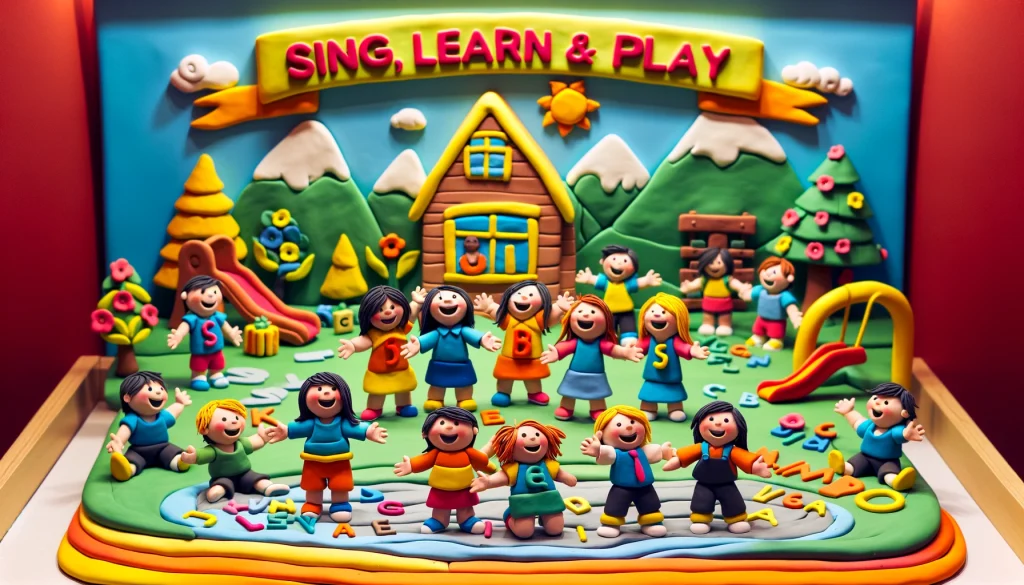
Making learning fun is key to a toddler’s development in North America, and what’s more engaging than singing? Sing-along alphabet songs for toddlers are a powerful tool for parents to introduce their little ones (aged 1-4) to the wonderful world of letters, laying the foundation for future reading and writing success.
Table of Contents
Benefits of Sing-along Songs for Toddlers:
- Spark Early Literacy Skills: Repetition is key for toddlers, and catchy alphabet songs help them learn letter recognition and sounds effortlessly.
- Boost Memory and Focus: Singing strengthens memory pathways and improves focus, important skills for learning the alphabet and beyond.
- Bonding Through Music: Singing together creates a warm and loving environment, fostering a positive connection between parent and child.
- Develop Language Skills: Alphabet songs expose toddlers to new vocabulary and enhance their pronunciation skills.
- Open the Door to Reading: By associating letters with sounds and fun melodies, alphabet songs make learning to read a more natural and enjoyable experience.
Beyond the Basics: Choosing the Right Alphabet Sing-Along Songs
With so many alphabet song options available, North American parents have a wealth of choices. Here are some factors to consider:
- Age-appropriateness: Select songs with a tempo and melody that suit your toddler’s age and energy level.
- Educational Value: Look for songs that incorporate letter sounds and phonics alongside the alphabet order.
- Engagement Factor: Choose songs with catchy tunes, clear vocals, and possibly even actions that toddlers can enjoy imitating.
- Visual Appeal: Consider incorporating alphabet videos with bright colors, engaging animations, or real-life imagery to capture your toddler’s attention.
Make it Fun! Activities to Complement Alphabet Sing-Along Songs
Learning shouldn’t stop at singing! Here are some engaging activities to reinforce the alphabet after a sing-along session:
- Craft Time: Create colorful alphabet flashcards or letter magnets together.
- Sensory Play: Fill a sensory bin with alphabet pasta or write letters in shaving cream to explore letters through touch.
- Story Time: Choose picture books with strong alphabet themes or stories that focus on specific letters.
- Sing It Again!: Repetition is key, so revisit favorite alphabet songs throughout the day.
By incorporating alphabet sing-along songs into your toddler’s routine, North American parents can nurture a love of learning, strengthen the parent-child bond, and set their little ones on the path to reading success. So put on some music, grab your little one, and get ready to sing, learn, and play!
We’ve explored the amazing benefits of alphabet sing-along songs for toddlers in North America and offered some tips on choosing the right ones. But the learning doesn’t stop there! Let’s delve deeper into how you can create a rich and engaging learning experience for your little one through the power of song.
The Alphabet Song: A Classic with Variations
The classic alphabet song is a timeless favorite for a reason. Its simple melody and clear pronunciation make it easy for toddlers to learn and remember the letter order. However, there are many creative ways to add variety and keep things interesting:
- Action Alphabet Songs: Get those wiggles out with action songs that incorporate movements for each letter. Jump for “J,” stomp for “S,” and tiptoe for “T.”
- Themed Alphabet Songs: Explore different themes that capture a toddler’s imagination. Dive into the ocean with an “Underwater Alphabet,” roar with a “Jungle Alphabet,” or soar through the sky with a “Space Alphabet.”
- Multilingual Alphabet Songs: Expose your child to the beauty of other languages with multilingual alphabet songs. This is a fantastic way to spark curiosity about different cultures in North America’s diverse environment.
Beyond Songs: Building a Foundation for Reading
While alphabet songs are a fantastic introduction to letters, here are some additional ways to build a strong foundation for reading:
- Letter Recognition Games: Play matching games with alphabet cards or hide magnetic letters for your toddler to find.
- Phonics Fun: Introduce basic phonics by focusing on the sounds individual letters make. Apps, toys, and even simple sound effects can be helpful tools.
- Point and Read: During everyday activities, point out letters on signs, packaging, or even their own clothing. Encourage them to identify the letters they recognize.
- Interactive Story Time: Choose interactive books with flaps, pop-ups, or textures that allow toddlers to engage with the story beyond just listening.
Technology as a Learning Tool: Apps and Online Resources
Technology can be a valuable tool in your toddler’s learning journey. Here are some ways to leverage apps and online resources:
- Educational Apps: Look for apps with interactive alphabet games, sing-along features, and even personalized learning paths.
- Online Videos: There’s a wealth of educational alphabet videos available online. Choose age-appropriate content with clear visuals and engaging songs.
- Streaming Services: Many streaming services offer children’s programming with educational shows that incorporate alphabet learning in a fun and interactive way.
Remember, the key is to make learning fun! Create a positive and relaxed learning environment where your toddler feels comfortable exploring letters and sounds. Celebrate their achievements, no matter how small, and keep the learning process engaging through variety and interaction.
With dedication and a little creativity, you can transform alphabet sing-along songs into a powerful tool that sets your North American toddler on the path to early literacy success. So crank up the tunes, grab your little one, and embark on a joyful learning adventure together!
Resources:
- Bright Horizons: https://www.playgroupnsw.org.au/parent-resources/the-importance-of-music-in-the-development-of-toddlers/ This website by Bright Horizons, a well-regarded childcare provider in North America, discusses the various benefits of music education for toddlers, including brain development, language skills, social-emotional skills, and motor skills.
- PBS: https://www.pbs.org/parents/thrive/the-benefits-of-music-education PBS, a trusted educational broadcaster in North America, offers a resource on the benefits of music education for children. It highlights the link between music and language development and mentions a study by Dr. Kyle Pruett at the University of Toronto. You can search for this study by author and university for more details.
- National Association for Music Merchants (NAMM Foundation): https://www.nammfoundation.org/ This organization is a great resource for information on music education. Their website might not have studies directly linked, but it discusses the benefits of music education for all ages, including cognitive development.

Leave a Reply